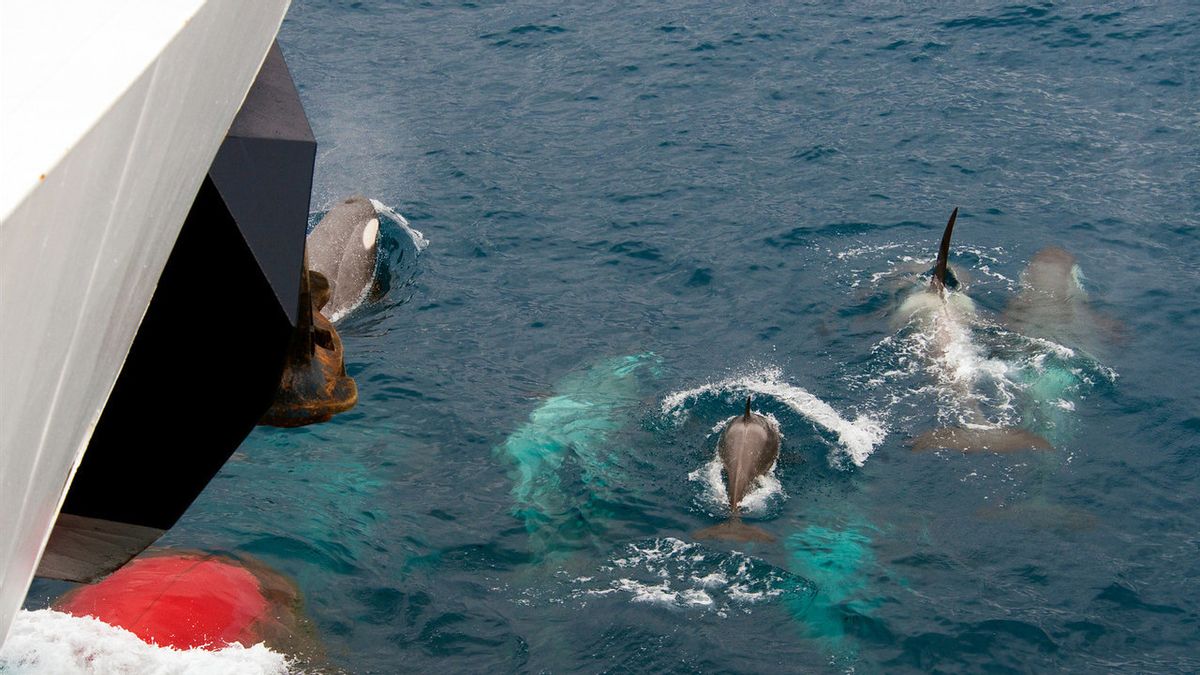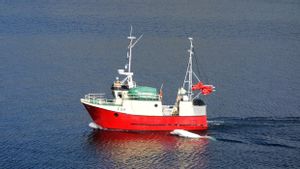JAKARTA - Killer whales attacked and sank a third ship off the coast of Iberia, Europe, last month, what researchers judged was imitated by similar species.
Three killer whales (Orcinus orca), crashed into a sailing ship on the night of May 4 in the Gibraltar Strait, off the coast of Spain and penetrated the wheel.
"There are two smaller orcas and one bigger orca," captain Werner Schaufelberger told German media Yacht, quoted from Live Science June 1.
"The small one shook the wheel behind, while the big one repeatedly withdrew and hit the ship with full strength from the side," he explained.
Schaufelberger said he saw smaller orca imitating the bigger one.
"Two small orcas observed a bigger behavior and, with a little run away, they also hit the boat."
The Spanish coast guard rescued the crew and pulled the ship to Barbate, but sank at the port entrance.
Two days earlier, six orca attacked another sailing boat sailing in the strait. Greg Blackburn, who was on board, watched the mother orca emerge to 'teach' her son how to get into the wheel.
"It must be some kind of education, teaching is ongoing," Blackburn told 9news.
Reports of aggressive gatherings with orca off the coast of Iberia began in May 2020 and become more frequent, according to a study published in June 2022 in the journal 'Marine Mammal Science'.
The attack appears to have been mainly directed at the sailing ship and followed a clear pattern, with orca approaching from the stern to attack the steering wheel, then losing interest once they managed to stop the ship.
"The interaction report has continued since 2020 in places where orca was discovered, either in Galicia or in the Strait," said researcher and author Alfredo L calmpez Fernandez, a biologist at Aveiro University in Portugal and representative from Groupo de Trabajo Orca Atlantica, or the Atlantic Orca Working Group.
"Most meetings are harmless", Lryptez Fernandez told Live Science via email.
"In more than 500 interaction events recorded since 2020, there are three ships that have sunk. We estimate killer whales to touch only one ship out of every hundred sailing through a location," he explained.
The surge in aggression against ships was a recent phenomenon, Lryptez Fernandez said. Researchers think events may have triggered a change in one-orca behavior, which has been studied by other populations to emulate.
"Orcas did this on purpose, of course, we don't know the origin or motivation, but defensive behavior based on trauma, as the origin of all of this, further strengthens us every day," explained L wayez Fernandez.
Experts suspect that the female orca they call White Gladis was experiencing a "critical moment of suffering" - a collision with a boat or trap during illegal fishing - which reverses behavioral changes.
"It was the traumatized organization that started physical contact behavior with the boat," said Lryptez Fernandez.
It is said, Orca is a social being that can easily study and reproduce the behavior of others, according to research in 2022. In most reported cases, orca goes straight to the wheel of the ship and bites, bends, or breaks it.
"We don't interpret that young teaching orcas, even though their behavior has spread to young ones vertically, simply by imitating, and then horizontally between them, because they think it's something important in their lives," said L wayez Fernandez.
Killer whales seem to consider the behavior profitable, despite the risks they face by crashing into the moving ship structure, added L wayez Fernandez.
Since abnormal interactions began in 2020, four orcas belonging to subpopulations living in Iberian waters have died, although their deaths cannot be directly linked to encounters with boats.
VOIR éGALEMENT:
This unusual behavior can also be a joke or one that researchers refer to as a "mode" of behavior initiated by one or two individuals and temporarily imitated by other individuals before being abandoned.
"They are very curious animals and like to play games, so this may be more of a game than an aggressive thing," Deborah totaled, an orca researcher at the University of Washington and at the nonprofit organization Wild Orca, told Live Science.
As the number of incidents increases, there are increased concerns for both sailors and Iberian orca subpopulations, which are listed as endangered on the IUCN Red List. The last census, in 2011, noted that there were only 39 Iberian orcas, according to research in 2022.
"If this situation continues or increases, it could be a real concern for the safety of sailors and conservation issues for the endangered subpopulation of killer whales," the researchers wrote.
The English, Chinese, Japanese, Arabic, and French versions are automatically generated by the AI. So there may still be inaccuracies in translating, please always see Indonesian as our main language. (system supported by DigitalSiber.id)


















